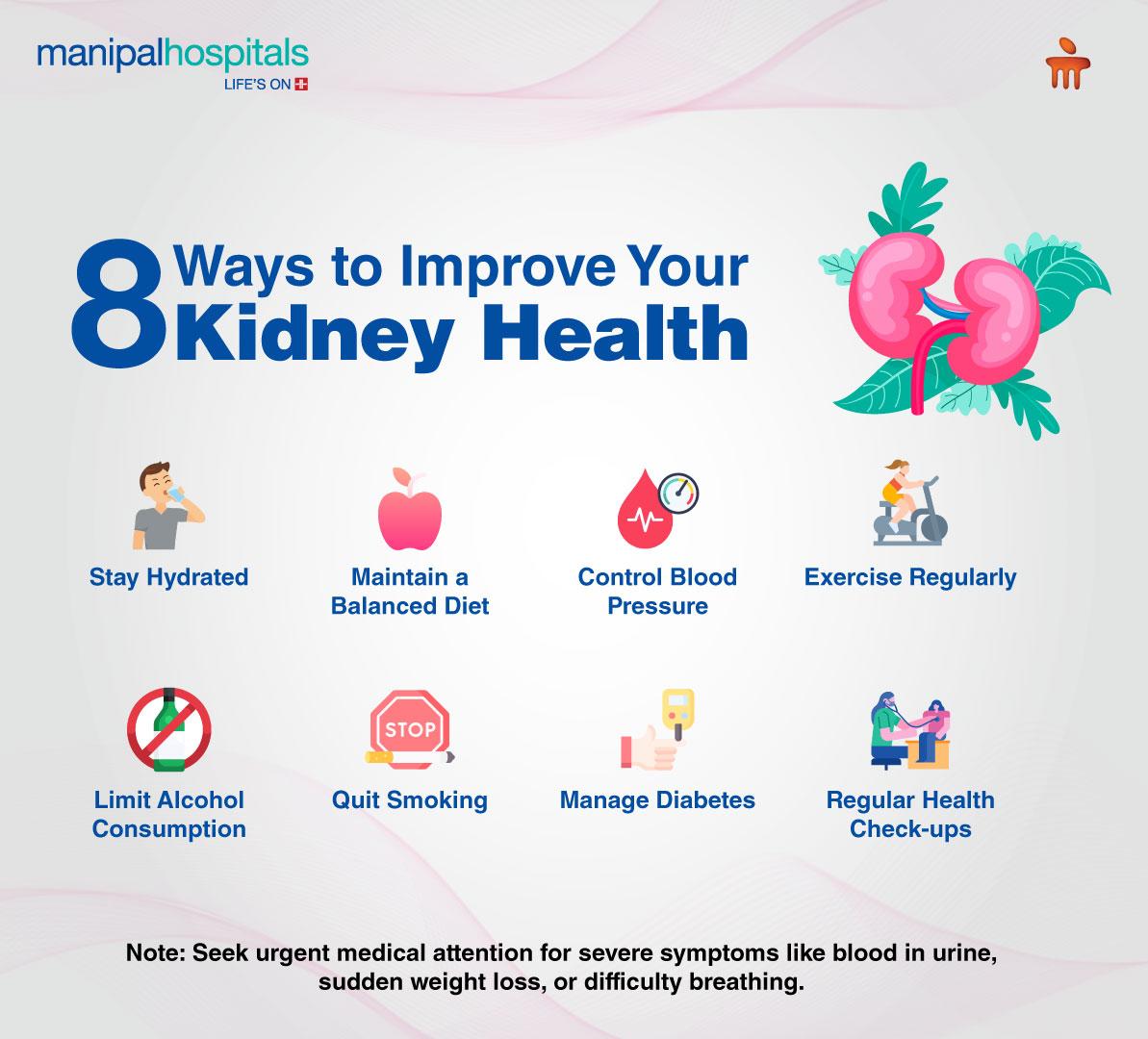
The kidneys are often underestimated yet indispensable organs, diligently execute the critical task of purifying blood, regulating electrolyte balance, and sustaining optimal blood pressure. Despite their paramount importance, kidney health is frequently neglected until complications surface. Kidney-related issues, encompassing chronic kidney disease (CKD), kidney stones, urinary tract infections, and glomerulonephritis, can exert far-reaching impacts on our overall well-being, ranging from fatigue and swelling to life-threatening kidney failure. In this blog, we delve into the pivotal role of kidneys, prevalent complications, and present eight actionable methods to ensure enduring kidney health.
Synopsis
The Importance of Kidneys
Our kidneys are the unsung architects of homeostasis within our bodies. Filtering around 200 quarts of blood daily, these organs produce 1 to 2 quarts of urine, expelling waste and excess fluids. Beyond filtration, kidneys regulate blood pressure, manufacture red blood cells, and manage electrolyte balance. Any disruption to these functions can instigate a cascade of health issues.
Common Kidney Complications
A myriad of kidney complications affects millions globally, posing a threat to well-being. Conditions such as CKD, kidney stones, urinary tract infections, and glomerulonephritis can inflict discomfort and fatigue, progressing to severe complications like kidney failure if left untreated.

Kidney Care: 8 Essential Ways
Given the pivotal role kidneys play in sustaining overall health, adopting habits that foster their well-being is imperative. Incorporating these eight simple yet impactful strategies into your lifestyle can proactively safeguard your kidneys.
-
Stay Hydrated: Adequate hydration is paramount for kidney health. Water aids in flushing out toxins and waste, thwarting kidney stone formation and promoting optimal function. Consume a minimum of eight glasses of water daily, adjusting based on activity and climate.
-
Maintain a Balanced Diet: A balanced diet is pivotal for kidney health. Limit sodium intake to control blood pressure and reduce processed food consumption. Opt for a diet rich in fruits, vegetables, whole grains, and lean proteins for essential nutrients without burdening your kidneys.
-
Control Blood Pressure: High blood pressure is a primary cause of chronic kidney failure or chronic kidney disease. Regularly monitor and manage blood pressure through lifestyle modifications, such as a healthy diet and regular exercise, to reduce the risk of kidney complications.
-
Exercise Regularly: Physical activity enhances blood flow and supports kidney function. Engage in at least 150 minutes of moderate-intensity exercise weekly, such as brisk walking or cycling, to promote cardiovascular health.
-
Limit Alcohol Consumption: Excessive alcohol can contribute to kidney damage. Practice moderation to reduce the risk of kidney-related issues.
-
Quit Smoking: Smoking accelerates kidney disease progression and increases the risk of kidney cancer. Quitting smoking is pivotal for kidney and overall well-being.
-
Manage Diabetes: Diabetes is a major contributor to kidney complications. Manage blood sugar levels through medication, diet, and regular monitoring to prevent CKD kidney damage.
-
Regular Health Check-ups: Routine health check-ups facilitate early detection of kidney-related issues. Regular screenings for blood pressure, blood sugar, and kidney function can identify problems before they escalate.
When Things Go Out of Control
Despite best efforts, chronic kidney failure may arise. Persistent symptoms like swelling, changes in urination patterns, fatigue, or pain warrant prompt consultation with a healthcare professional for early intervention.
When to Take Serious Action
Seek immediate medical attention for severe symptoms like blood in the urine, sudden weight loss, or difficulty breathing. These may signal advanced kidney disease or other serious conditions requiring urgent care.
Kidneys are vital organs that warrant our attention and care. By adopting these eight habits, you can take significant strides in preserving your kidney health. Prevention is always better than a cure, and prioritising kidney health today ensures a vibrant and healthy life tomorrow. Regular check-ups, a balanced lifestyle, and early intervention when needed are the cornerstones of kidney care. Let's not overlook our precious organs and take the best care possible for them.
FAQ's
The most common risk factors that help to develop kidney diseases are:
- High blood pressure
- Diabetes
- Family history of kidney disease
- Obesity
- Smoking
- Certain medications
Chronic kidney disease can progress without showing any symptoms in its early stages. However, some possible signs include:
- Uncontrollable high blood pressure
- Blood in the urine or foamy urine
- Frequent or decreased urination
- Swelling in the ankles, feet, or hands
- Fatigue and weakness
- Loss of appetite
- Difficulty in sleeping
Foods that promote good kidney health and may even slow kidney disease progression are:
- Fruits and vegetables
- Low-fat dairy products
- Whole grains
- Healthy fats



















 4 Min Read
4 Min Read













